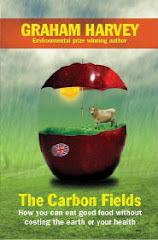
The hedge bank on the left has probably been in place for a century or more. But following the intense winter rain we’ve been getting lately it has started to collapse. The mud in the road isn’t just from the hedge. It also contains a lot of silt from the adjoining field. The soil is literally washing away. Along with it goes the land’s ability to grow food for future generations.
The cause of the damage is the condition of the field. It has been cultivated for a cereal crop which means that it has been left exposed to the elements. Had it gone into the winter as pasture, the soil would have been held in place by the grass roots. Soils under grass are able to retain a lot more moisture, so the chances are the winter deluge wouldn’t have burst through the hedge bank taking half the field with it.

A few days after I took my pictures the local council moved in with diggers, trucks and half a dozen staff. In a job that must have cost thousands, they installed a heavy-duty new drainage system to take away the torrents that regularly run off the fields nowadays. This quiet country lane has never needed drains like this before, but then the land was mostly under pasture.
If we’re serious about saving the planet we’re going to have to put a lot more of our farmland back into pasture. It’s the only way we in Britain are going to secure a truly sustainable food supply. As a bonus it’ll also give us healthier meat, eggs and dairy produce than we’ve enjoyed for year. After all, grass-fed is the new organic.
- For the full story of grassland read The Carbon Fields. Visit www.grassrootsfood.com


1 comment:
The deluges last year, which were 3 times more frequent than even in 2007 (I have the figures. In 2008 there was 15 or 16 days with >20mm rain, compared to 5 in 2007 and 4 in 2006 - figs from Thatcham, Berks) meant a lot more problems than usual with water and, with it, soil being washed off fields. On one of my regular routes into the Berkshire Downs it was very clear what the effect has been of removing what would have been very old hedges between the arable fields and the (minor) road. No hedges and there was loads of surface water on the road. Hedges intact = no water. There are still far too few farmers embracing sustainable farming methods - in fact I'd say that the ones that do are a very very significant minority, at least that is the case on the Berkshire Downs. Pity is we should all be taking the sort of photos that Graham is - because we need to collect the visual evidence to demonstrate this is the case. Maybe this is something that could be promoted using vols - it may help with the forthcoming major review of CAP.
Sue Everett
Post a Comment